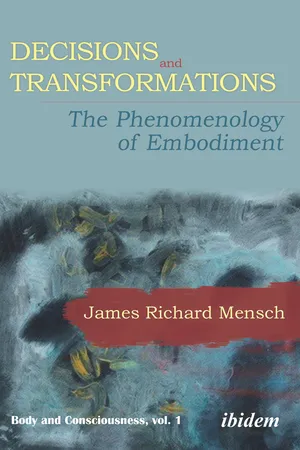
- English
- ePUB (mobile friendly)
- Available on iOS & Android
About this book
To say that we are embodied subjects is to affirm that we are both extended and conscious: both a part of the material world and a place where that world comes to presence. The ambiguity inherent in our being both can be put in terms of a double "e;being in."e; Thus, while it is true that the world is in consciousness taken as a place of appearing, it is equally true that, taken as embodied, consciousness is in the world. How can our selfhood support both descriptions? Starting with Husserl's late manuscripts on birth and death, James Mensch traces out the effects of this paradox on phenomenology. What does it mean to consider the self as determined by its embodiment? How does this affect our social and political relations, including those marked by violence? How does our embodiment affect our sense of transcendence, including that of the divine? In the course of these inquiries, such questions are shown to transform the very sense of phenomenology.
Frequently asked questions
- Essential is ideal for learners and professionals who enjoy exploring a wide range of subjects. Access the Essential Library with 800,000+ trusted titles and best-sellers across business, personal growth, and the humanities. Includes unlimited reading time and Standard Read Aloud voice.
- Complete: Perfect for advanced learners and researchers needing full, unrestricted access. Unlock 1.4M+ books across hundreds of subjects, including academic and specialized titles. The Complete Plan also includes advanced features like Premium Read Aloud and Research Assistant.
Please note we cannot support devices running on iOS 13 and Android 7 or earlier. Learn more about using the app.
Information
Table of contents
- Contents
- Introduction
- Part I Embodiment and the Transformation of Husserlian Phenomenology
- Chapter I Birth, Death, and Sleep: Limit Problems and the Paradox of Phenomenology
- Chapter II The Numerical and the Unique Singularity of the Ego in the C Manuscripts
- Chapter III The Spatiality of Subjectivity
- Chapter IV Life and the Reduction to the Lifeworld
- Chapter V Life and Horizon
- Chapter VI Rethinking Subjectivity as an Environmental Concept
- Part II Embodiment and the Singularity of Selfhood
- Chapter VII Self-Identity from the Perspective of the Body
- Chapter VIII Temporality and Embodied Self-Presence
- Chapter IX Social Change and Embodiment
- Part III Trust and Mistrust
- Chapter X Belief and Trust, an Analysis of Husserl’s Epoché
- Chapter XI Trust and Violence
- Chapter XII Violence and the Return of the Religious
- Part IV Sacrifice and the Presence of the Divine
- Chapter XIII Suffering and Theodicy
- Chapter XIV Embodiment and the Experience of the Divine
- Chapter XV Flesh and Forgiveness
- Afterword
- Bibliography